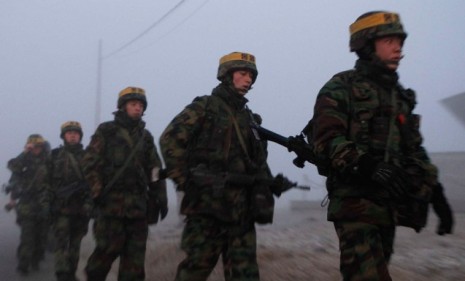Should South Korea stick to its guns?
South Korea flexed its military muscles, despite dire retaliatory threats from Pyongyang. Who stands to lose in this high-stakes poker game?

Defying threats of "brutal consequences beyond imagination" from North Korea, and pleas from Russia and China, South Korea conducted 90 minutes of live-ammunition military exercises on Monday off Yeonpyeong Island. The North's deadly shelling of Yeonpyeong in November sparked the latest round of tensions, and Seoul's hard-line response is popular with angry South Koreans. But is ratcheting up already-high tensions really the best plan? (Watch the U.N. Security Council's comments)
The South has good reason to act tough: South Korea usually backs down amid the "overblown threats" from "its buck-wild northern cousin," says Spencer Ackerman in Wired. But that strategy has been a "political disaster for Seoul" this year. And since Pyongyang doesn't seem to be gearing up for a retaliation, what's the harm in pushing back with some warning shots away from North Korea?
"Second Korean War to start today (or not)"
The Week
Escape your echo chamber. Get the facts behind the news, plus analysis from multiple perspectives.

Sign up for The Week's Free Newsletters
From our morning news briefing to a weekly Good News Newsletter, get the best of The Week delivered directly to your inbox.
From our morning news briefing to a weekly Good News Newsletter, get the best of The Week delivered directly to your inbox.
Any conflict will only hurt the South: South Koreans' new, "understandable" thirst for vengeance puts the Koreas closer to war than at any time in the past 25 years, says Andrei Lankov in The Korea Times. But "if anything, a powerful strike which is much hoped for by the public, will damage the South Korean economy." Seoul shouldn't necessarily "turn the other cheek," but unlike the North's Kim Jong Il, the South has a lot to lose from a fight.
The real loser is the U.S.: More ominous than South Korea's military exercises are its air-raid drills and investment in bomb shelters, says Robert Haddick in Foreign Policy. That means it really is gearing up for a smaller-level skirmishes with the North. So Pyongyang won't get its "payoff" for acting up this time, but the real cost could be borne by the U.S: A "small war" on the peninsula would be like Afghanistan, but with much more expensive weapons.
"Could North Korea be the next Afghanistan?"
A free daily email with the biggest news stories of the day – and the best features from TheWeek.com
-
 ‘Admin night’: the TikTok trend turning paperwork into a party
‘Admin night’: the TikTok trend turning paperwork into a partyThe Explainer Grab your friends and make a night of tackling the most boring tasks
-
 Find art, beautiful parks and bright pink soup in Vilnius
Find art, beautiful parks and bright pink soup in VilniusThe Week Recommends The city offers the best of a European capital
-
 Greenland: The lasting damage of Trump’s tantrum
Greenland: The lasting damage of Trump’s tantrumFeature His desire for Greenland has seemingly faded away